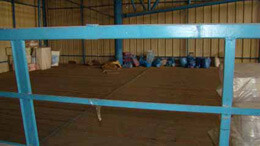Palestinian Center for Human Rights 10 October 2008

Badreddin al-Redaisi and Partners, the largest plastics and polystyrene manufacturer in the Gaza Strip, remains chronically short of vital raw materials. (PCHR)
Redaisi is Head of Marketing and Sales at the Badreddin al-Redaisi and Partners polystyrene and plastics factory in Gaza city, the largest plastics manufacturer in the Gaza Strip. The factory opened more than two decades ago, and until recently there were 65 full time staff plus another 35 at several other smaller subsidiary workshops and factories owned by the same company. But the workforce has now been halved and the remaining staff have had their hours cut back. “Our problem is we don’t have enough raw materials to work with” says Redaisi. “We have an order of four hundred and 20 tons of plastic and polystyrene waiting over the border, in Ashkelon [in Israel]. It has been in storage there for more than a year, because we can’t get permission to bring the materials across the border into Gaza, but we still have to pay storage fees. So instead of making money, we are losing it.”
Redaisi says plastic and polystyrene are in such short supply in Gaza that his staff have been forced to ask customers to supply their own raw materials for the factory to manufacture into finished plastic and polystyrene products. Badreddin, al-Redaisi and Partners have also been forced to drastically cut down on the variety of items they produce; going from almost 100 different types of plastic and polystyrene containers and packaging to half a dozen basic models, including water carriers and olive oil containers.
The Gaza Strip has six border crossings, five of which are directly controlled by Israel. The sixth crossing, at Rafah on the Egyptian border, has been almost continually closed since June 2006. Israel therefore controls the movement of goods in and out of Gaza. Its illegal siege and closure of the Gaza Strip has included mass restrictions on imports and exports, including imports of vital raw materials for the construction, manufacturing, textile and furniture industries, as well exports of manufactured products. Chronic shortages of vital raw materials, plus the continuing widespread ban on exports from Gaza to the outside world, have both been major factors in the near collapse of the Gazan economy.
Between June 2007-2008, approximately 42,000 Gazan construction workers lost their jobs due to the Israeli ban on imports of construction materials, and the construction sector sustained overall losses estimated at $58 million. Out of 120 registered construction companies across the Gaza Strip, only five are still operating. During the same period, wood and furniture manufacturers and retailers sustained losses of around $110 million, forcing 600 local furniture workshops and factories to close. In addition, 624 textile and clothing workshops and factories have also shut down, at the cost of more than 25,000 local jobs. Many of these furniture and textile workshops and factories were small, family run businesses, which supported and employed entire extended families. Prevented from traveling outside Gaza, local people have no viable work alternatives, and unemployment, and chronic poverty, have subsequently spiraled.
Forty five percent of working age adults in the Gaza Strip are now officially unemployed, and Gaza has de-developed into one of the most aid dependent communities on earth. Investors have been forced to either suspend or else simply cancel projects, including major reconstruction projects, due to lack of raw materials. Overall investment in Gaza from donors and corporations has dropped from $250 million in 2005 to a current estimate of approximately $10 million.
The ceasefire agreed between Israel and Hamas on 19 June this year has made precious little difference to the stunted economy of the Gaza Strip. The Israeli Occupation Forces (IOF) have permitted the entry of limited amounts of construction materials, like concrete and aggregate, to enter Gaza in the last three-and-a-half months. Other materials, including plastics, polystyrene and textiles remain either banned or else available only in miniscule amounts. The IOF continue to hold the entire Gazan economy hostage, forcing manufacturers to turn to the now-thriving black market in order to obtain basic raw materials at inflated prices so they can stay in business.
“We need about 30 tons of raw materials a month to run the factory at full capacity” says Redaisi as he shows us around the factory floor and adjoining warehouse. “This is one of the busiest times of the year because of the olive harvest, so we need even more raw materials to make the olive oil containers. But now we are buying ready-made containers from Israel, and just selling them on, because we can’t make our own products.” As Israel profits from its illegal siege of Gaza, Rafat Redaisi and his colleagues are desperately trying to keep the factory open. He invites us to see the almost empty two-story warehouse, with its straggle of finished products waiting to be delivered across the Gaza Strip. “More than a year ago, this warehouse was full of manufactured goods” he says. “But now we have so much empty space in here, we can play football.”
This report is part of the Palestinian Centre for Human Rights’ Narratives Under Siege series.
Related Links